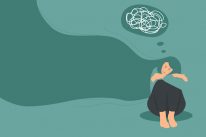“When you judge another, you do not define them. You define yourself.” -Wayne Dyer
The other day, I reached out to someone I admire, and felt disappointed by the experience. I perceived her response to be somewhat curt and even condescending, which surprised me. Based on my earnest enthusiasm and admiration—and what I thought I knew about her—I expected more.
For a minute I thought, “She’s not who I thought she was at all.”
While this was clearly a lesson in releasing expectations, it also got me thinking about (what I call) the judgment/assumption principle: when we judge someone based on one impression, and then assume that’s how and who they are—always.
I suspect we do this more than we realize.
Maybe you see an interview with a public figure, and, based on the topics discussed, assume she’s a shallow person. Or you meet a friend of a friend when he’s having a difficult day and, based on his withdrawn demeanor, assume that he’s unfriendly.
It can be tempting to judge someone by an isolated moment in time, especially if it’s a first impression and a particularly negative one.
But none of us would want to be sized up that way. We are so much more than what we may convey in any one encounter—and sometimes, we have good intentions, but they get muddled in translation.
I know I haven’t always put my best foot forward; and I’m sure I’ve also said things and sent emails that could have been interpreted as curt, even though I meant well.
None of us should have to tolerate chronically rude or inconsiderate treatment; but we may be surprised by what we learn about people when we give them the benefit of the doubt.
Today if you’re tempted to form a snap judgment based on one interaction, remember: When you judge someone by one of their worst moments, you rob yourself of the opportunity to see and appreciate their best.

Photo by spencer341b
About Lori Deschene
Lori Deschene is the founder of Tiny Buddha. She started the site after struggling with depression, bulimia, c-PTSD, and toxic shame so she could recycle her former pain into something useful and inspire others to do the same. You can find her books, including Tiny Buddha’s Gratitude Journal and Tiny Buddha’s Worry Journal, here and learn more about her eCourse, Recreate Your Life Story, if you’re ready to transform your life and become the person you want to be.
- Web |
- More Posts













 Though I run this site, it is not mine. It's ours. It's not about me. It's about us. Your stories and your wisdom are just as meaningful as mine.
Though I run this site, it is not mine. It's ours. It's not about me. It's about us. Your stories and your wisdom are just as meaningful as mine. 